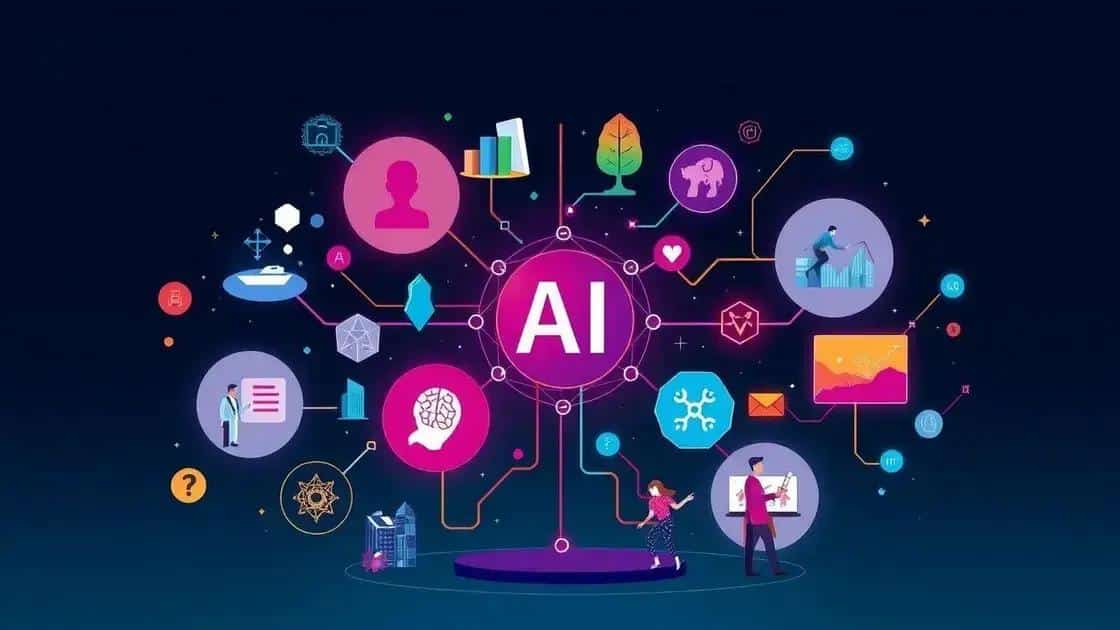Popularity of generative AI courses is on the rise
The popularity of generative AI courses is driven by their ability to equip learners with essential skills for high-demand job markets in technology, marketing, and healthcare.
The popularity of generative AI courses is transforming the educational landscape. Have you noticed more people diving into these innovative fields? Let’s explore why these courses capture so much attention.
Understanding generative AI and its applications
Understanding generative AI is key to grasping its potential. This technology uses advanced algorithms to create new content, from images to text. It’s like having a smart assistant that can help generate ideas and material based on given prompts. People are increasingly interested in how this technology can fuel creativity and efficiency across various sectors.
Generative AI has diverse applications that shape industries. From art and music to scientific research, its impact is profound. For instance, artists are using AI to explore new realms of creativity, producing stunning visuals that blend human imagination with machine learning.
Applications of generative AI
In addition to creative fields, generative AI enhances functionality in several areas:
-
💊 Healthcare: AI models help in drug discovery and personalized medicine.
-
📈 Marketing: Businesses use AI to create engaging ad content tailored to their audiences.
-
🎮 Gaming: AI generates expansive game landscapes and character designs, enriching user experiences.
The fascination with generative AI stems from its ability to transform how we approach tasks. With tools that can mimic human-like creativity, it opens up new possibilities. People wonder, how can I harness its power?
As we explore its impact, it’s clear that generative AI is not just a passing trend. It is reshaping the landscape of innovation. As more learners engage with this technology, they will undoubtedly find surprising uses and applications. The future seems bright as industries embrace generative AI.
Why generative AI courses are trending
Why generative AI courses are trending is a question many are asking today. The rise of this technology is not just a fad; it reflects a shift in how we view creativity and innovation. People are eager to learn about the capabilities of generative AI, which can create stunning content, solve complex problems, and enhance productivity.
As businesses and individuals recognize its power, more courses appear to meet this growing demand. These courses offer valuable insights into the mechanisms behind generative AI and its practical applications. They serve as gateways to understanding how to harness this technology in various sectors.
Driving factors behind the trend
Several factors contribute to the increasing popularity of generative AI courses:
- Accessibility: Online platforms make learning easy and affordable, reaching a global audience.
- Career opportunities: Knowledge of generative AI opens doors to high-demand job roles in tech and creative industries.
- Innovation: Organizations seek to innovate, promoting a culture of continuous learning.
The interest in generative AI courses is fueled by real-world applications. Companies see the value in understanding how this technology can optimize processes. From generating marketing content to developing new products, the possibilities are immense. As a result, more learners are taking steps to engage with generative AI.
Generative AI is also becoming easier to use thanks to advancements in technology. Tools and platforms are emerging that simplify the process of creating AI-generated content. This accessibility means that anyone, regardless of their tech expertise, can start creating with generative AI.
This trend in education is likely to continue, as the demand for knowledge about generative AI grows. As more industries adopt these technologies, professionals will need to keep pace. Courses provide essential skills and knowledge, equipping learners for the future.
Key skills learned in generative AI courses
Key skills learned in generative AI courses are essential for anyone looking to thrive in today’s technology-driven world. These courses equip learners with knowledge that goes beyond basic understanding, diving deep into practical applications and theories. By mastering these skills, students prepare themselves for a variety of career opportunities.
One important skill is understanding machine learning principles. This includes knowledge of algorithms that empower machines to learn from data. Courses often cover different types of algorithms, such as supervised and unsupervised learning, allowing students to apply the right methods based on their needs.
Specific skills gained
Students can also expect to develop several specific skills, including:
-
📊 Data manipulation: Learning how to gather, clean, and process data efficiently is crucial.
-
🤖 Model training: Understanding the techniques to train models effectively on various datasets.
-
✍️ Content generation: Gaining insights into how to create unique and compelling content using AI tools.
Another key aspect is the development of programming skills. Most courses provide a strong foundation in programming languages such as Python. This knowledge is vital, as programming is often needed to implement machine learning algorithms and handle data.
Furthermore, students learn to navigate popular AI frameworks and libraries. Tools like TensorFlow and PyTorch are frequently mentioned, and proficiency in these can significantly improve a student’s ability to develop and deploy AI models.
Collaboration is another important skill fostered in generative AI courses. Students often work in teams on projects, which helps build teamwork and communication skills. This collaborative environment simulates real-world work settings, preparing learners for future roles in diverse teams.
As more industries embrace generative AI, the demand for these specialized skills will continue to grow. Understanding these key skills will not only boost employability but also empower professionals to innovate within their fields.
Impact of generative AI on various industries

Impact of generative AI on various industries is profound and far-reaching. This revolutionary technology is transforming how businesses operate and innovate, leading to significant changes across multiple sectors. As generative AI tools become more integrated into everyday practices, their influence grows stronger.
In the healthcare industry, generative AI is changing the landscape by enhancing diagnostics and personalized medicine. By analyzing vast amounts of medical data, AI can identify patterns that assist doctors in making more accurate diagnoses. Additionally, it helps in drug discovery by simulating how different compounds might interact in the body.
Industry Applications
The benefits of generative AI extend beyond healthcare. It has significant applications in:
- Marketing: AI generates personalized content for audiences, improving engagement rates and marketing effectiveness.
- Entertainment: In film and video games, generative AI creates realistic characters and environments, enhancing the viewer’s experience.
- Finance: AI analyzes market trends to predict stock movements and manage risks more effectively.
In education, generative AI provides tailored learning experiences. By assessing student performance, AI systems can suggest personalized learning paths that cater to the strengths and weaknesses of each learner. This customization leads to improved understanding and retention of knowledge.
Moreover, in the manufacturing sector, generative AI optimizes design processes and reduces production costs. By generating efficient designs and simulating various production scenarios, companies can streamline operations and minimize waste. This leads to a more sustainable approach in the industry.
As these examples show, generative AI is not just a technological advancement; it is paving the way for new business models and operational efficiencies. Industries that harness its capabilities will likely gain a competitive edge in their markets.
Success stories from generative AI course graduates
Success stories from generative AI course graduates highlight the transformative impact of these educational programs. Many individuals who have completed such courses report significant changes in their careers and personal projects. These stories serve as inspiring examples of how learning about generative AI can lead to opportunities and innovation.
One notable success story comes from a graduate who developed an AI tool to help artists create unique designs. This graduate utilized skills learned in their generative AI course, applying machine learning techniques to generate new artistic styles. The tool not only gained popularity among artists but also attracted attention from major art galleries.
Impact on various fields
Graduates have made strides in multiple sectors, including:
-
💻 Information Technology: A former student created a program that automates data analysis, saving companies time and resources.
-
📈 Marketing: Another graduate implemented AI-driven campaigns that significantly increased engagement and sales for their clients.
-
📚 Education: Some learners have developed personalized learning platforms that adapt to the needs of each student, enhancing the educational experience.
These stories reflect the broad impact of generative AI on career trajectories. Many graduates report that the skills acquired in their courses have equipped them to tackle complex challenges and innovate within their fields. By understanding how to leverage AI technologies, they have gained competitive advantages in the job market.
Mentorship and networking opportunities from these courses also play a crucial role in the success of graduates. Many programs connect students with industry professionals, allowing them to gain valuable insights and build relationships. This support network can be vital for those looking to break into the field or explore new ventures.
As more success stories emerge, they serve as a testament to the power of generative AI education. The ability to create, innovate, and solve problems using AI technology is becoming increasingly important across various industries.
Future job market for generative AI skills
The future job market for generative AI skills is rapidly evolving, reflecting the increasing integration of AI technologies in various industries. As businesses continue to recognize the importance of innovation, skilled professionals in generative AI will be in high demand.
The job market is seeing a growing need for individuals who can develop, implement, and manage generative AI systems. Many companies are searching for experts who can create AI-driven solutions that enhance productivity and efficiency. Graduates of AI courses are often best positioned to meet this demand.
Emerging job roles
A variety of new job roles are emerging that focus on generative AI. Some of the most sought-after positions include:
- Machine Learning Engineer: These professionals design and implement machine learning applications, helping organizations leverage AI.
- AI Research Scientist: Research scientists work on developing new algorithms and models to push the boundaries of AI capabilities.
- Data Scientist: Data scientists analyze complex data sets, using generative AI to uncover insights and make data-driven decisions.
As companies adopt these technologies, they will also seek individuals who can navigate the ethical considerations surrounding AI use. Understanding the implications of AI-generated content and ensuring responsible use will be essential skills for future professionals.
The impact of generative AI extends to traditional roles as well. For instance, marketing professionals will increasingly rely on AI tools to customize campaigns and generate engaging content. This shift indicates that knowledge of generative AI will be beneficial across multiple sectors.
Moreover, the demand for generative AI skills is likely to lead to new educational programs and training workshops that focus on these emerging technologies. As the industry evolves, the emphasis on continuous learning will be crucial for staying competitive in the job market.
Overall, the future job market for generative AI skills is bright. Those who invest in their education and develop expertise in this area will find numerous opportunities across industries.
Comparing online and in-person generative AI courses
Comparing online and in-person generative AI courses reveals important differences that potential learners should consider. Each format has unique advantages and challenges, serving different types of students and learning preferences.
Online generative AI courses have become increasingly popular due to their flexibility and accessibility. Students can learn at their own pace and access materials from anywhere. This format often includes video lectures, interactive exercises, and forums for discussion with peers and instructors. Students appreciate the convenience of fitting learning into their busy schedules while also having the opportunity to revisit lectures as needed.
Benefits of online courses
Some key benefits of online courses include:
-
⏰ Flexible scheduling: Learners can choose when to study, making it easier to balance work and education.
-
📚 Wide range of resources: Many online courses provide access to diverse materials, including tutorials, e-books, and community support.
-
💸 Cost-effectiveness: Online courses often come at a lower price point compared to their in-person counterparts.
On the other hand, in-person courses offer unique benefits that some students find valuable. Interacting face-to-face with instructors and classmates can enhance the learning experience. Being physically present in a classroom allows for immediate feedback, hands-on projects, and networking opportunities that may not occur online.
Advantages of in-person courses
Key advantages of in-person learning include:
- Direct interaction: Students can ask questions and receive real-time responses from instructors.
- Collaboration: Group exercises and discussions foster teamwork and deeper understanding of the material.
- Structured environment: A set schedule may help some students stay focused and committed to their learning goals.
Ultimately, the choice between online and in-person generative AI courses depends on individual learning styles and circumstances. Some learners thrive in collaborative environments, while others benefit from the flexibility of online platforms. When making a decision, it is essential to consider personal goals, lifestyle, and preferred learning methods.
How to choose the right generative AI course

How to choose the right generative AI course is an important decision for anyone looking to advance their knowledge in this field. With numerous options available, it can feel overwhelming to find the best fit. Considering your specific goals and preferences is essential when evaluating different programs.
Start by identifying your learning objectives. What do you hope to gain from the course? Are you looking to develop practical skills, dive into research, or enhance your career prospects? Being clear about your goals will help narrow down your choices and focus on programs that align with your interests.
Factors to consider
Several factors play a crucial role in selecting the right course:
-
📚 Course content: Review the syllabus to ensure it covers topics that are relevant to your interests and goals. Look for courses that offer hands-on projects and case studies.
-
👨🏫 Instructor expertise: Research the qualifications and experience of the instructors. Having knowledgeable and experienced teachers can significantly enhance your learning experience.
-
📝 Student reviews: Read testimonials and feedback from previous students. This can provide valuable insights into the course quality, structure, and effectiveness.
-
🔄 Flexibility: Consider whether the course format suits your learning style. Do you prefer an online course for its flexibility, or do you thrive in an in-person classroom environment?
Next, think about the learning format that suits you best. Some individuals learn more effectively through hands-on experience, while others may prefer a theoretical approach. Online courses may provide the flexibility you need, while in-person options can offer immediate feedback and collaborative opportunities.
Lastly, take the time to explore any additional resources offered by the course. Some programs provide networking opportunities, mentorship, and access to industry professionals that can enhance your learning experience and career prospects.
By carefully evaluating these factors and aligning them with your personal goals, you can make a more informed decision when selecting a generative AI course. This thoughtful approach can lead to a rewarding learning experience that significantly enhances your skills and knowledge in this rapidly evolving field.
In summary, choosing the right generative AI course is essential for anyone looking to enhance their skills in this exciting field. By considering factors such as course content, instructor expertise, student reviews, and flexibility, learners can make informed decisions that align with their personal and professional goals. Generative AI has a growing impact across various industries, and acquiring knowledge in this area opens up numerous career opportunities. Whether opting for online or in-person courses, the key is to find a program that best suits your needs and learning style. With thoughtful consideration, you can embark on a rewarding educational journey that enhances your skills and prepares you for future success.
FAQ – Frequently Asked Questions about Generative AI Courses
What should I look for when choosing a generative AI course?
Look for key factors like course content, instructor expertise, student reviews, and whether the format fits your learning style.
Are online generative AI courses as effective as in-person ones?
Yes, online courses can be equally effective, offering flexibility and various resources, though in-person classes provide direct interaction.
How can a generative AI course help my career?
These courses equip you with valuable skills that are in high demand, opening up opportunities in various industries such as tech, marketing, and healthcare.
What types of projects can I expect in a generative AI course?
You can expect hands-on projects that involve creating AI models, analyzing data, and developing applications to reinforce your learning.





